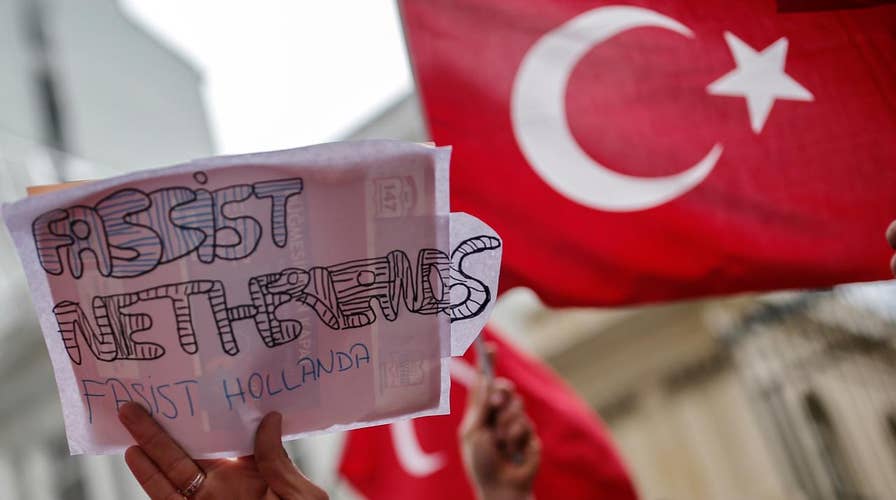Turkey’s president stood firm behind his blistering comments that accused the Dutch government of “Nazism and fascism” and vowed on Sunday the Netherlands would “pay the price” for barring Turkish ministers from the country, a move that has dramatically swelled tensions between the NATO allies.
The diplomatic dustup arose Saturday when Dutch Prime Minister Mark Rutte prevented a pair of Turkish ministers from traveling within the Netherlands. Family and Social Policies Minister Fatma Betul Sayan Kaya and Turkish Foreign Minister Mevlut Cavusoglu had intended to attend rallies for the country’s Turkish population in support of a controversial constitutional referendum set to take place in Turkey. But Kaya was prevented from entering a diplomatic compound and eventually escorted to Germany, while Cavusoglu was barred from landing in the Netherlands.
“I have said that I had thought that Nazism was over, but that was wrong,” Turkish President Recep Tayyip Erdogan said during a live television address on Sunday. “Nazism is alive in the west.”
Turkey has already banned the Dutch ambassador from returning to Turkey and Cavusoglu said the country has “other steps in mind.”
“We’ve already begun planning them,” he said. “We will certainly take those steps and more.”
The Dutch barred Cavusoglu from entering because of objections to his intention to attend a referendum rally in Rotterdam. If passed, the new laws would expand Erdogan’s powers, which the Dutch see as a step backward from democracy. Turkish officials have been campaigning in various European cities with Turkish populations before the April 16 vote.
Related stories...
The Dutch government said it withdrew permission to land because of "risks to public order and security.”
Hundreds of pro-Turkey protesters gathered into the night in Rotterdam. The protests led to a scuffle with police as Dutch officials used a water cannon to disperse the group, Reuters reported.
The dispute also comes just days before the Netherlands goes to the polls next Wednesday for the lower house of Parliament. The campaign has been dominated by issues of identity, with anti-Islam lawmaker Geert Wilders set to make strong gains. Rutte’s strong stance towards Turkey in this weekend’s conflict, however, could help Rutte bolster his own image with the voting public, perhaps helping to stave off Wilders’ charge, experts say.
Amsterdam political scientist Andre Krouwel said Rutte’s moves show voters “we are the ones who go down in the trenches to defend the Netherlands.”
The Associated Press contributed to this report.









































